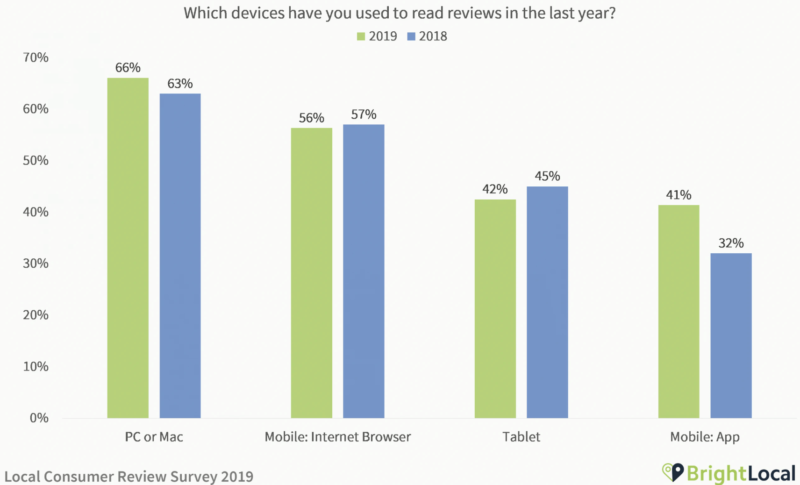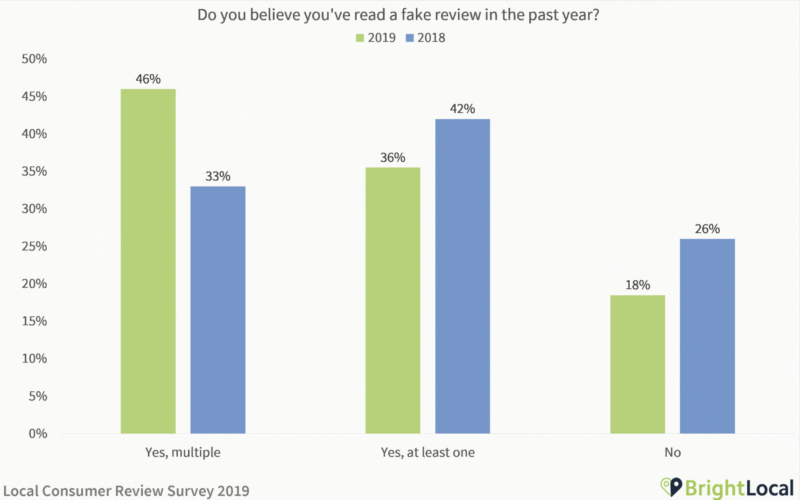Consumers more invested in reviews, but also more skeptical of authenticity — survey
Users now consult multiple sites and expect reviews to be relatively fresh.
Users are increasingly relying on search and reviews when looking for local businesses, the latest BrightLocal consumer reviews survey finds. However, it also shows increasing skepticism of review authenticity and adaptive consumer behavior to combat review fraud.
The survey polled just over 1,000 U.S. adults during November.
Vast majority do local search. As a foundational matter, the survey asked about local search. It found that more people (90%) were searching for local businesses with greater frequency than last year. Frequency and penetration were associated with age; younger users searched more often.
The same was true of review reliance. Younger users (18 – 34) more heavily relied on reviews than older cohorts. Although the groups who “always” and “regularly” read reviews were comparable for the 18 – 34 and 35 – 54 age categories.
Surprisingly, the most common device for local review consumption was desktop, followed by the mobile browser. This finding was not broken out by age group, however. One would expect younger users to be more mobile-centric.

Reviews drive almost immediate conversions. After reading reviews, the most common next step was “visit the business’s website,” followed by “search for more reviews to validate your choice” and “visit the business.” In other words, people read reviews and then either visit the website or physically visit the location in question.
Large majorities of respondents agreed that positive and negative reviews influenced their decision-making. Reviews were more trusted by younger users as a generalization.
Recency and overall star ratings were the two most important features of reviews. How recent must reviews be? Within the past two weeks was cited by nearly half (48%) as being important but, overall, 59% wanted them to be no more than a month old. Those under 55 were more sensitive to the freshness of reviews content.
On average, it takes at least 10 reviews to create trust. That number was higher (13) for those under 34 years old. In addition, 70% said they now look at multiple review sites before choosing a business. This, combined with looking at multiple review sites, is an anti-fraud strategy with 68% saying they regularly “question the authenticity of reviews.”

Increasing awareness or experience of fake reviews. The number of people who believe they’ve read fake reviews increased significantly this year compared to 2018. This could also be a function of greater awareness of a fake reviews problem (i.e., in the news) rather than actual experience of fake reviews.
About two-thirds (66%) of survey respondents said they had been asked to leave a review by a business, either face to face or by email or otherwise (e.g., chatbot). Of the total population, 51% said that they did leave reviews when asked, while 16% did not. In 2018, 46% said they left a review and 20% did not, indicating increasing willingness to leave reviews.
The average number of reviews written in 2019 was 9, with 18 – 34 year olds writing more (11) and older users (55+) writing less (5). By far the most common reason to leave a review was a positive experience with or at the business.
The most common way that consumers are solicited for reviews is “in person during a sale.” Interestingly, 40% of survey respondents said that a business owner or manager had left a response “for every review I left.”

Why we care. The lessons of the survey are fairly clear: consumers increasingly depend on but are also cautious and critical of reviews. Businesses need a regular stream of reviews on multiple sites. That means Google, Yelp, TripAdvisor, Facebook, and potentially other online directories, depending on the industry in question. In-person and email solicitation are the most widely used and effective review solicitation tactics. However, Yelp terms prohibit direct solicitation, while other sites do not.
It’s also clear that most reviews are positive. So the tactical takeaway, notwithstanding the Yelp qualification, is: ask all your customers for reviews (in an ethical way) and make sure you do this on an ongoing basis for multiple sites that matter to your industry. In addition, respond to your customers’ reviews — especially if they’re negative.
Contributing authors are invited to create content for Search Engine Land and are chosen for their expertise and contribution to the search community. Our contributors work under the oversight of the editorial staff and contributions are checked for quality and relevance to our readers. Search Engine Land is owned by Semrush. Contributor was not asked to make any direct or indirect mentions of Semrush. The opinions they express are their own.


